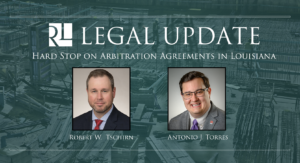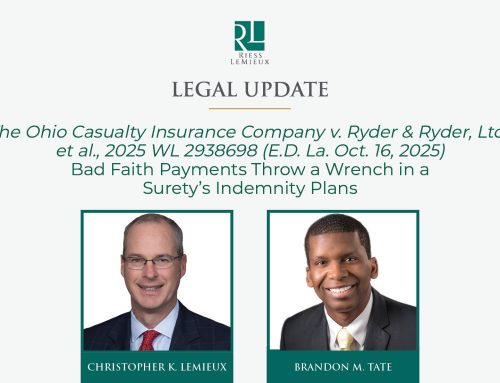 Hard Stop on Arbitration Agreements in Louisiana Public Contract Insurance Agreements
Hard Stop on Arbitration Agreements in Louisiana Public Contract Insurance Agreements
Authors: Robert W. Tschirn and Antonio J. Torres
The Louisiana Supreme Court has laid down a decisive ruling in Police Jury of Calcasieu Parish v. Indian Harbor Ins. Co., et. al., 2024-00449 (La. 10/25/24), reinforcing the state’s long-standing prohibition on compulsory arbitration provisions in insurance contracts issued in Louisiana. With Justice Pro Tempore Jeannette Theriot Knoll writing for the Court, the opinion addresses three certified questions from the United States District Court for the Western District of Louisiana, Lake Charles Division, and underscores that Louisiana’s courts, not distant or arbitral tribunals, hold jurisdiction over insurance disputes involving Louisiana-issued insurance policies. In this case, Louisiana’s highest Court did not merely decline to open the door to arbitration—it locked it and threw away the key. Through this opinion, Louisiana’s positive law remains the last word, especially as to La. R.S. 22:868’s prohibition against arbitration clauses in insurance contracts, affirming a principle that goes to the heart of the state’s judicial sovereignty.
Certified Question 1: Does the addition of Subsection D to La. R.S. 22:868 Repeal by Implication Subsection A’s prohibition against arbitration clauses? Answer: No
The first certified question asked the Court to determine whether the Louisiana Legislature’s 2020 amendment to La. R.S. 22:868—adding Subsection D, which permits forum or venue selection clauses in certain insurance contracts—implicitly opened the door to arbitration despite Subsection (A)(2)’s prohibition against policy provisions that “depriv[e] the courts of [Louisiana] of the jurisdiction or venue of action against the insurer.” The Court’s response, after analysis under Louisiana’s well established statutory interpretation framework, is emphatic: a firm “no.” Justice Knoll clarified, “[a]n arbitration clause cannot be categorized so broadly as a forum or venue selection clause when it operates to fully deprive courts of jurisdiction of action.” This distinction is not simply legal semantics; it is central to Louisiana’s public policy. Arbitration, unlike forum selection, effectively bars the courthouse doors, a result that Louisiana has historically resisted in its insurance code.
Citing principles of statutory interpretation, Justice Knoll noted that any statutory repeal by implication is disfavored, especially when the provisions are not irreconcilably inconsistent. Subsections (A) and (D) of La. R.S. 22:868, the Court explains, coexist without conflict: while subsection (D) carves out a narrow exception for forum or venue selection clauses in limited circumstances, it does not invite arbitration clauses barred by Subsection (A)(2). In doing so, the Court draws upon Creekstone Juban I, L.L.C. v. XL Ins. Am., Inc., 2018-0748 (La. 5/8/19), 282 So. 3d 1042, where the Court declined to extend the definition of “jurisdiction” to include “venue or “forum”. Similarly, the Court here “decline[ed] to extend the definition of ‘venue’ or ‘forum’ to include ‘jurisdiction’ for purposes of La. R. S. 22:868(D) to allow arbitration clauses.” The message to Louisiana insurers and litigants alike is clear: arbitration clauses have no place in Louisiana-issued insurance contracts.
Certified Question 2: Does La. R.S. 9:2778’s prohibition against arbitration clauses in public contracts apply to insurance policies? Answer: Yes
Turning to the second certified question, the Court examined La. R.S. 9:2778, which deems provisions in public contracts with the state or its political subdivisions that require dispute resolution outside Louisiana or the application of non-Louisiana laws as inequitable and against public policy. Accordingly, the statute declares such clauses null, void, and unenforceable. Though enacted in 1992, this statute had not been definitively interpreted by the Court until now. In Calcasieu, the second certified question asked whether La. R.S. 9:2778 applies to all contracts with political subdivisions of the State. As the Court observed, “[t]he answer to this certified question rest[ed] on whether an insurance policy with a political subdivision is a ‘public contract’ within the meaning of La. R.S. 9:2778.”
In Calcasieu, it was undisputed that the Plaintiff was a political subdivision and that the Defendants contracted with the Plaintiff to provide insurance coverage for properties owned by the subdivision for the public’s benefit. The insurance policies clearly covered public properties, funded by taxpayer dollars, with no private actors involved in the transactions between the parties. Based on these factors, the Court readily found that insurance contracts with political subdivisions, like the policies at issue here, qualify as public contracts under La. R.S. 9:2778. Justice Knoll’s opinion clarified the Court’s view: La. R.S. 9:2778 applies to all contracts with political subdivisions, including insurance policies.
In reaching this conclusion, the Court emphasized Louisiana’s broad public policy against removing jurisdiction in contracts involving publicly funded entities. By classifying insurance policies as “public contracts” under La. R.S. 9:2778, the Court ensures that insurance coverage for publicly owned properties—funded by taxpayer dollars—remains squarely within Louisiana’s judicial purview. This decision aligns with the rationale in Chennault Int’l Airport Auth. v. Starr Surplus Lines Ins. Co., 2:22-CV-02735, 2023 WL 2637450 (W.D. La. Mar. 24, 2023), and City of Westlake v. Republic Fire & Casualty Ins. Co., 664 F. Supp. 3d 665 (W.D. La. 2023), in which both courts applied La. R.S. 9:2778 to deem forum selection clauses in Louisiana insurance policies with political subdivisions unenforceable. Louisiana’s aversion to private arbitration in public contracts could hardly be stated more plainly.
Certified Question 3: Can domestic insurers use equitable estoppel to enforce arbitration clauses in international insurers’ policies? Answer: No
The third certified question in Calcasieu actually had two parts: (1) whether a domestic insurer may invoke equitable estoppel to enforce an arbitration clause in another insurer’s policy, thereby circumventing La. R.S. 22:868(A)’s prohibition on arbitration clauses; and (2) whether estoppel can be applied to political subdivisions without meeting the heightened standard required for public bodies.
The Court noted that equitable estoppel—a common law doctrine—is not generally favored in Louisiana’s civil law system, where it is viewed as a “doctrine of last resort.” Justice Knoll emphasized the Court’s longstanding position that “there is no place in Louisiana law for a common law doctrine addressing subjects of existing positive law in the Civil Code.” The Court explained that equitable estoppel is unavailable here because it conflicts directly with La. R.S. 22:868, which prohibits arbitration clauses in Louisiana-issued insurance policies. Consequently, domestic insurers may not use this doctrine to compel arbitration based on clauses in another insurer’s policies, as this would clearly contravene La. R.S. 22:868(A)(2). Such a finding, the Court reasoned, would both (1) violate Louisiana’s positive law against arbitration in insurance policies, and (2) open the door for domestic insurers to exploit a last-resort doctrine to compel arbitration through foreign policies—a result incompatible with Louisiana’s public policy.
The Court squarely confronted the Fifth Circuit’s per curiam in Bufkin Enterprises, LLC v. Indian Harbor Insurance Co., 96 F.4th 726 (5th Cir. 2024), which allowed non-signatory domestic insurers to use equitable estoppel to compel arbitration through foreign insurers’ policies. Justice Knoll’s opinion directly rejects this interpretation, labeling it “flawed and not supported by Louisiana law.” The Court is unequivocal: equitable estoppel cannot override Louisiana’s positive law. As Justice Knoll stated, if positive law governs a matter, “no jurisprudence, usage, equity, or doctrine” can prevail over it. Here, Louisiana’s public policy, as codified in La. R.S. 22:868, flatly prohibits arbitration in Louisiana-issued insurance contracts—a prohibition that domestic insurers cannot use equitable estoppel to circumvent.
With this ruling, the Court leaves little room for insurers to question Louisiana’s commitment to maintaining Louisiana Courts’ jurisdiction over insurance disputes. The second prong of the third question—whether equitable estoppel could apply to political subdivisions without a heightened standard—was deemed moot by the Court’s holding as to the first prong. As the Court emphatically noted, “arbitration continues to be prohibited in all insurance policies delivered or issued for delivery in Louisiana.” Insurers should take heed.
Takeaways
In Police Jury of Calcasieu Parish v. Indian Harbor Insurance Co., the Louisiana Supreme Court has drawn a clear line: arbitration clauses simply have no place in Louisiana-issued insurance contracts, especially those involving public entities. With this ruling, the Court affirmed that Louisiana’s positive law—as embodied in statutes like La. R.S. 22:868 and La. R.S. 9:2778—takes precedence over doctrines of equitable estoppel and outside interpretations that seek to undermine state jurisdiction. Justice Knoll’s opinion sends a powerful message that Louisiana’s public policy will not yield to private arbitration, particularly when it comes to public contracts funded by taxpayers and overseen by Louisiana’s courts.
The Court’s response to each certified question reinforces a single, unyielding principle: Louisiana’s courts maintain the exclusive jurisdiction over disputes involving Louisiana-issued policies, protecting public contracts and public funds from being drawn into distant forums or governed by foreign laws. For insurers, the takeaway is unequivocal—Louisiana’s judicial authority is not up for negotiation. As the Court has made abundantly clear, attempts to sidestep these statutory protections with arbitration clauses or common law doctrines will be met with firm resistance. Louisiana’s courts stand ready to uphold the state’s legislative intent, ensuring that the state’s public policy remains the final word in insurance contracts covering Louisiana’s interests.



